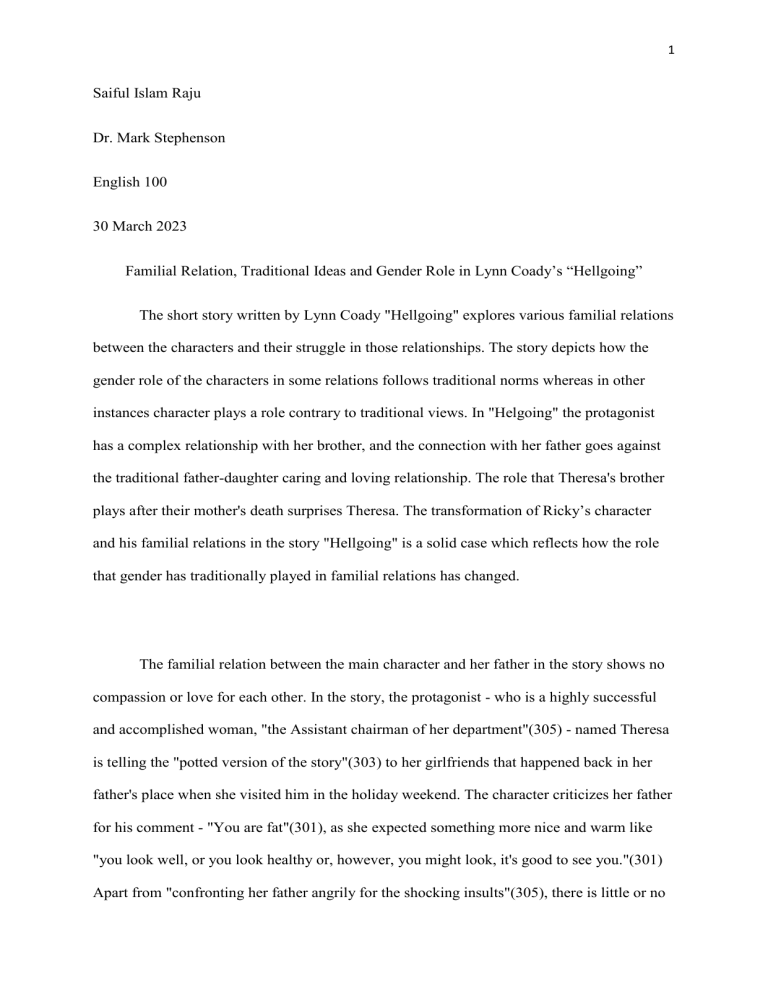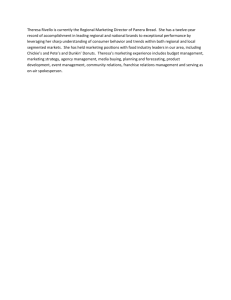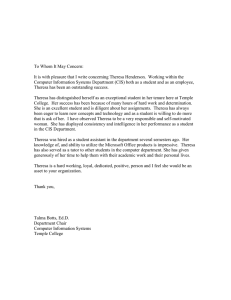
1 Saiful Islam Raju Dr. Mark Stephenson English 100 30 March 2023 Familial Relation, Traditional Ideas and Gender Role in Lynn Coady’s “Hellgoing” The short story written by Lynn Coady "Hellgoing" explores various familial relations between the characters and their struggle in those relationships. The story depicts how the gender role of the characters in some relations follows traditional norms whereas in other instances character plays a role contrary to traditional views. In "Helgoing" the protagonist has a complex relationship with her brother, and the connection with her father goes against the traditional father-daughter caring and loving relationship. The role that Theresa's brother plays after their mother's death surprises Theresa. The transformation of Ricky’s character and his familial relations in the story "Hellgoing" is a solid case which reflects how the role that gender has traditionally played in familial relations has changed. The familial relation between the main character and her father in the story shows no compassion or love for each other. In the story, the protagonist - who is a highly successful and accomplished woman, "the Assistant chairman of her department"(305) - named Theresa is telling the "potted version of the story"(303) to her girlfriends that happened back in her father's place when she visited him in the holiday weekend. The character criticizes her father for his comment - "You are fat"(301), as she expected something more nice and warm like "you look well, or you look healthy or, however, you might look, it's good to see you."(301) Apart from "confronting her father angrily for the shocking insults"(305), there is little or no 2 conversation between them throughout the story. Theresa finds the single comment from his father very offensive. Interestingly, the writer brings up the relation between Ruth and her father, "who is a provincial supreme court justice, long divorced and their story about going on cruises to different parts of the world,"(302) in between Theresa's anecdote to imply the loving and caring role an ideal father should play in traditional views. Throughout the story, Ricky's role in making an effort to bring the family together, and taking charge and responsibility for the little family after his mother's death surprises Theresa. From previous experience and following traditional views about genders, Theresa expected "the bachelor pair of father and son to simply merge into one horrific masculine amalgam."(302) She expected her childhood home "to have gone completely to hell."(304) But to her surprise, she finds Ricky more responsible as he got better instead of worse. The phrase "got better instead of worse"(302) depicts that according to traditional ideas, a man gets worse without a woman. A woman, whether she be a wife or mother, in traditional views, brings a man's life together. Cleaning a man's mess, looking after him, carrying food to his bed and even sending gifts and cards to relatives on his behalf are some examples. Things Theresa's mother used to do for her husband when she was alive and Jenn's anger when "her mom carries the card all over to her Dad's chair for him to sign"(303) support these traditional notions. So Theresa was no different in thinking that Ricky's life will get worse after his divorce and their mother's death. But to the contrary, she finds her childhood home clean, tidy and orderly under Ricky's watch. He even made his father get up from the bed for the tea which was not at all normal when their mother was alive. Although Ricky is a 3 lot like his father according to Theresa, he not only takes care of himself, or his old twoheaded, tea-slurping father, but also makes an extra effort to invite Theresa for a thanksgiving dinner. According to Theresa and her friends, women keep the family together, and it is true in the case of Theresa's family. Ricky acknowledges "that they had for years depended on their mother to give a shit on everybody else's behalf"(303) and the force that keeps the familial bond is his mother's relentless effort. So after their mother's death and Theresa's long distance from her family, the first thing Theresa anticipated is that the family and their relation will be in shambles. But throughout the story, Ricky's efforts make the family bond from falling apart. Ricky shows sympathy as he approaches with his caring attitude towards Theresa, "smiling in pain like her friends"(301) and "trying to make her feel better"(306) after the mean comment their father makes, even though they are not each other's "greatest ally and defender."(301)The brother-sister relation is seen to have gone to a wholly new dimension. He also urges Theresa to make some similar efforts like her mother used to make to keep the family together. This drastic change in Ricky towards her and the family was very much against Theresa's expectations from a traditional perspective. Theresa's answer to her friend's question "What happens when women stop giving a shit"(304) is son steps up to break the traditional gender role, "the way Ricky has."(304) 4 Works Cited Coady, Lynn. “HELLGOING” The Broadview Introduction to Literature: Second Edition General Editors Lisa Chalykoff, Neta Gordon and Paul Lumsden. Peterborough: The Broadview Press, 2018.


